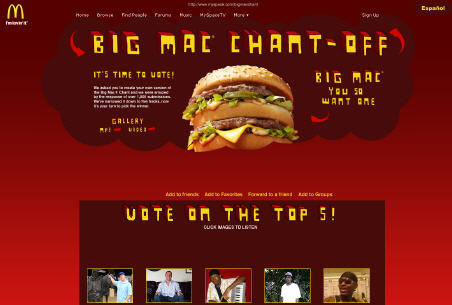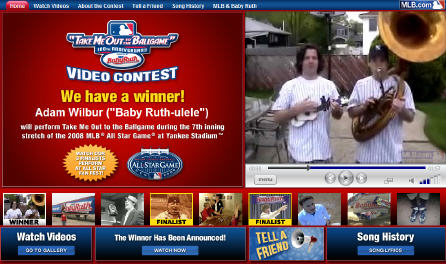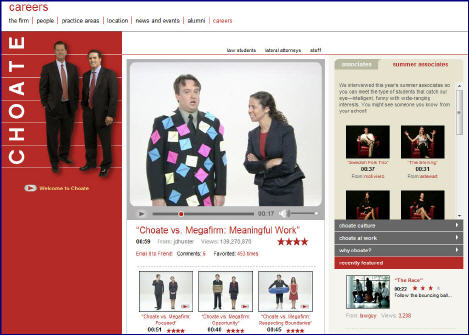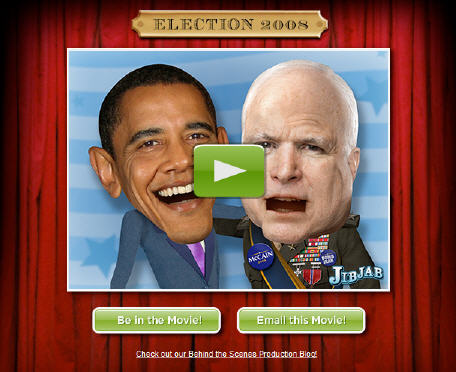-
Friday Fun from Bio-Rad and Eppendorf
Ending the week on a lighter note, I want to point out two videos sure to make you chuckle. If you're thinking they're from late-night comedians or new online comedy networks or even YouTube's user-generated video trove, think again. They're from about the most unlikely place you can imagine: the life sciences industry.
That's right, two life sciences companies, Bio-Rad Laboratories and Eppendorf AG are demonstrating that the so-called "democratization of video" has truly reached into some unexpected places.
The funnier of the two is Bio-Rad's "Scientists for Better PCR," a hilarious and campy imitation of "We Are the World" featuring a collection of singer lookalikes (I spotted Bob Dylan, Bette Midler, Stevie Wonder, Joe Cocker, Quincy Jones and others...see who you can identify). Also, it's worth clicking on the "Download the Lyrics" link to see the actual words they're singing - it makes the experience even more amusing.
In case you were interested, which I'm guessing most of you are not, PCR stands for "polymerase chain reaction" which is a method to find the genes/DNA of a living organism. The song brings the product to life in a way that no other marketing collateral ever could have done. The PCR song has been out for a while, but hadn't hit my radar. Hat tip to Anystream's Geoff Allen for bringing it to my attention.
Meanwhile, also check out Eppendorf's hilarious boy band sendup to promote its epMotion Automated pipetting system (don't ask me what this product does). Again take a look at the lyrics to add to the humor.
This week I've spent a fair amount of time highlighting how brands and others are using broadband video in creative and clever ways to bring their messages to life. When I see all of these examples, I continue to be impressed with just how versatile the broadband medium is.
Categories: Brand Marketing
-
McDonald's is Next with Big Mac UGV Contest
Yesterday I wrote about Baby Ruth's MLB All-Star Game UGV contest, and outlined the reasons why we should expect to see a lot more of these brand-sponsored UGV contests.
Sure enough, like clockwork, yesterday's NYTimes carried a long article about McDonald's new "Big Mac Chant-Off" UGV contest. This one, run in conjunction with MySpace, solicits video and audio submissions of users re-creating the fast food chain's famous 1974 "2 All Beef Patties" jingle. Though not tied to a marquee event like the All-Star Game, the Academy Awards of the political conventions as are the other UGV contest I mentioned yesterday, the McDonald's contest's tie in with MySpace gives it extra buzz.
The NYTimes article also notes another UGV contest from Klondike ("What Would You Do for a Klondike Bar?" This contest sports a $100,000 prize, and judging by the number of entries, plenty of people are gunning for it.
As I said yesterday, I expect no end to the number of brands that are going to pursue these kinds of UGV contests. -
Baby Ruth Hits a Home Run with UGV All-Star Game Contest
Baby Ruth hit a home run at Tuesday night's All-Star Game with its "Take Me Out to the Ballgame" user generated video contest. The contest was heavily promoted during the All-Star Game and ran in association with Major League Baseball.
In case you missed it, the challenge was to creatively sing the classic ballpark tune in 2 minutes or less. The contest received dozens of submissions, which were then narrowed to a list of finalists, judged by a committee of three. The judging criteria was weighted heavily toward originality, but also included creative use and/or incorporation of the Baby Ruth brand, ensuring that the candy maker got strong visibility in the videos. The winner got to perform during the 7th inning of the game. (I didn't see this part of the game, so I don't know if it happened. Note a peeve is that MLB/Baby Ruth should be offering video of the winner singing at Yankee Stadium, which would be an instant classic, but doesn't seem to be.)
Still, I'm a big fan of UGV contests like this especially when the brand, contest and tie-in event all harmonize, as was the case with this Baby Ruth contest. Though these contests require significant upfront coordination, the payoff is that they are a unique branding opportunity that can inexpensively break through today's ad clutter. Not to mention these contests are a real crowd-pleaser, playing on the same voyeuristic viewer impulses that programs like American Idol have tapped into brilliantly.
I've said repeatedly that the abundant volume of UGV available at YouTube and elsewhere provides evidence that there's a ton of amateur talent out there. Brands and others that figure out how to leverage it can generate excitement and deepen customer engagement. In addition - and with a little luck - these videos can also turn into viral sensations, driving a near infinite ROI for the underlying brand.
Other recent examples that combine UGV with high profile events include Dove's "Supreme Cream Oil Body Wash Ad Contest" (in conjunction with the Academy Awards) and MySpace/NBC's "Decision '08 Convention Contest" (in conjunction with this summer's political conventions). I expect more to come. If you see examples, please let me know!
What do you think? Post a comment now!
Categories: Brand Marketing, Sports, UGC
Topics: Baby Ruth, Dove, MLB, MySpace, NBC
-
Choate Uses Broadband Video to Shake Up Law Firms' Competitive Dynamics
Choate Hall & Stewart is an old-line Boston law firm whose innovative use of broadband video shows how out-of-the box thinking can shake up the competitive dynamics of a very traditional industry.
As Betsy Huntley, Choate's Director of Marketing explained to me, a key audience for Choate (and indeed all major firms) are top law students who are heavily recruited for summer and full-time associate employment. Year in and year out successful recruiting is key to every firm's existence.
Last year, Choate's interactive firm, Greenfield Belser, pointed out that the firm's young recruits were increasingly immersed in the YouTube/Facebook culture, so one way Choate could connect better with them and separate itself from its competitors was by doing something out-of-the box, like offering video.
To put the video idea in perspective, Betsy noted that to their knowledge no other law firm had used video as a recruiting tool (nor has any still). Such an initiative would be groundbreaking, and risky. As a rule, most law firms do not embrace risk or even the appearance of it. Being perceived as ultra responsible custodians of their clients' interests is far more important than looking like a web 2.0 rock star.
Choate's partners debated the video concept intensively, ultimately deciding to go forward. Then, like Hollywood executives, Choate needed to weigh programming ideas, scripts, formats and the like. Scrambling against recruiting deadlines, the impressive results can be seen in the "Careers" section of their web site.
You'll notice first that playing in the center window are several clever spoofs of the classic "Mac vs. PC" ads (complete with reminiscent music), featuring a Choate "associate" and an associate at "Megafirm." In addition, in the right hand navigation are a collection of "Red Chair" interviews where Associates share something about themselves, adding a distinctive personal feel to the site. There are lots of other talking head interviews, humorous skits and vintage footage. Betsy said the guiding philosophy was "though we take our work and clients seriously, we try not to take ourselves too seriously."
The videos have been a huge success for the firm, as Betsy noted they "streamlined every point in the recruiting process" starting with improved candidate self-selection, more productive, in-depth interviews, a higher acceptance rate on offers made and a higher quality of new hires. All recruits said they'd seen the videos and reacted positively. They especially appreciated seeing their friends candidly discussing their experiences.
I give Choate a lot of credit. Embracing video was a risky bet that undoubtedly felt like very foreign territory for the firm. Yet its experience demonstrates how video newcomers can shake up their industries and distinguish themselves from their competition. Further, it also reinforces the notion that video professionals have a huge new pool of clients to work with. As video becomes a core part of more organizations' communications efforts, video experts are going to be in higher and higher demand.
What do you think? Post a comment now!
Categories: Indie Video
Topics: Choate Hall & Stewart, Greenfield Belser
-
New JibJab 2008 Election Video is Live
The JibJab guys just keep cranking out high-quality cartoons in their signature style. The latest, released today at JibJab.com and MySpace focuses on the current presidential election. It's another solid entry, though I must admit the 2004 "This Land is Your Land" spot will always be the gold standard for me. With JibJab's "Sendables" feature, so you can upload your picture and be a part of the video too.Categories: Indie Video
-
Google, Others Syndicating Video Into the Long Tail
The trend toward widespread video syndication to small-to-medium sized web sites continues to gain momentum.
Two recent initiatives - plus others I expect are still to come - point to the increasing likelihood that broadband video's eventual distribution model will look far different from traditional, tightly-controlled approaches. I'm becoming more convinced that "syndicated video economy" concept I sketched out in March is where the market is heading.
The first initiative, covered in a recent NYTimes article, "Google and Creator of 'Family Guy' Strike a Deal" suggests that Google may finally be ready to point its powerful AdSense engine toward video distribution.
 AdSense, as many of you likely know, essentially created a "long tail of advertisers" by dispersing targeted pay-for-performance keyword-based ads to tens of thousands of small-to-medium sized web sites. Including Google Ads has become a no-brainer for many sites seeking to easily pick up a few extra bucks by allocating some on-site real estate to AdSense.
AdSense, as many of you likely know, essentially created a "long tail of advertisers" by dispersing targeted pay-for-performance keyword-based ads to tens of thousands of small-to-medium sized web sites. Including Google Ads has become a no-brainer for many sites seeking to easily pick up a few extra bucks by allocating some on-site real estate to AdSense.Now instead of distributing ads, Google is looking to take the AdSense model a step further by distributing video content (along with ads) to myriad web sites hungry for video, and cash. First up are comedic webisodes from Seth MacFarlane (creator of Fox's "Family Guy"). Google's proposition to small, and even larger sites, makes sense: we'll give you free high-quality video content, all supported by pay-for-performance ads. You get great content and can make money at it. What's not to like? Not much in my opinion. It seems like such a compelling model that one wonders why Google hasn't done this earlier. In fact, they did. Back in August 2006, Google announced a test with MTV to do exactly the same thing (the ensuing YouTube-Viacom litigation no doubt scotched the test). Hopefully this time around Google will have more luck.
Meanwhile, hyper video syndication is not just for the mighty like Google. Consider Jambo Media, a two year-old company with 12 employees which has built out a syndication network now generating over 2 million video views per day. Web sites like BestCelebGossip.com, Epigee.org and MensTech.com may not be household names, but, as Jambo's CEO and co-founder Rob Manoff explained to me, they are representative of virtually unlimited long tail web publishers eager for video, but unable or unwilling to create it themselves.

Rob and his team of ex-affiliate marketing and advertising veterans have created the Jambo Video Network by licensing video from sources such AP, iVillage, Ivanhoe Broadcast News, and then packaging them into "channels" for distribution in a Jambo video player. Of course ads come along with the video content (though Jambo has a separate ad-free "JamboCast" white label solution in the works too).
Affiliate sites can login to their Jambo account to select which channels to receive while customizing the look and feel of the video player. Over 100 sites have affiliated, which Rob believes will grow to several hundred by the end of '08, driving a projected 5 million views/day. Rob said that sites earn $2-4 effective CPM with revenue per day ranging from $10-30 on the low end all the way up to $1,000/day on the high end.
Jambo is pursuing a space that syndicators like Roo, Voxant, ClipSyndicate, Newsmarket and others have been in for a while. All of these players, along with now Google, are doing what Rob articulates well: creating video ad inventory where none previously existed. Such is the power of syndication in the frictionless Internet environment. And why smart content providers - from startups to established TV networks - are recognizing that increasingly, syndication is where the broadband market is heading.
Note: if you want to learn more about syndication and how one big content provider is succeeding with it, please join me for a webinar entitled, "Profiting from the Syndicated Video Economy." The webinar is sponsored by Akamai and will feature a presentation from Greg Clayman, Executive VP, Digital Distribution and Business Development, MTV Networks and me. Registration is free.
Categories: Advertising, Indie Video, Syndicated Video Economy
Topics: ClipSyndicate, Google, Jambo Media, Newsmarket, ROO, Voxant
-
New TDG Research Provides Details of Broadband Video Advertising's Growth
The Diffusion Group, a leading analytics and advisory firm specializing in broadband media and the digital home, is releasing a new report tomorrow entitled, "Online TV and the Future of Digital Video Advertising." VideoNuze is offering half a dozen slides as a complimentary download (note, VideoNuze has no financial interest in this report).
Though I haven't seen the full report, in a conversation with Mugs Buckley, the report's author (and also periodic VideoNuze contributor), I got a sneak peek at some of its key conclusions. The report is based on TDG's proprietary consumer research and modeling, interviews with industry executives, data from other firms and other secondary research. In sum, the report pegs '08 video ad revenue at $590 million, growing to $9.98 billion in 2013.
To establish some order, Mugs first identifies four types of video, estimating each one's current market share
 in terms of stream count and ad revenue and then forecasting them through 2013. The four types are "user generated video," "long-form," "short clips" and "other" (which includes all paid models, adult content, corporate and educational videos, etc.).
in terms of stream count and ad revenue and then forecasting them through 2013. The four types are "user generated video," "long-form," "short clips" and "other" (which includes all paid models, adult content, corporate and educational videos, etc.). No surprise, UGV currently accounts for 42.4% of streams, but only 3.7% of ad revenues. Conversely, long-form accounts for only 2.2% of streams but 41.6% of ad revenues. Note the disparity would be lower if, instead of using streams (where one 40 minute TV show stream is equivalent to one 10 second clip stream on YouTube), the report used "minutes viewed" or another consumption-centric metric. I agree with Mugs though - in either case, the underlying point would still be true - long-form, higher-quality video is going to be where ad dollars are and will be concentrated.
The report's forecast reinforces the point: by 2013, long-form's stream share will roughly double to 4.1%, with its share of ad revenue growing to 69.4%. Conversely UGV's stream share grows a little bit, but its ad share shrinks to 1.8% . A wildcard in this mix is the role of short-clips, defined as 2-5 minute videos including everything from news/entertainment/sports videos to webisodes. Mugs is bullish on this segment, with its lower costs to produce and ability for users to watch spontaneously. This is where a lot of market activity and original programming is happening and it's still early to gauge its acceptance by users and advertisers.
A key input to the revenue forecast is the underlying CPM forecast. Mugs said her approach was to be relatively conservative with CPM's predicting little more than inflation-adjusted growth. For long-form that means CPMs growing from $40 today to $46 in 2013, which feels pretty modest, especially if targeting and engagement tactics pay off (see more on Disney's efforts in this post). On the UGV CPM forecast, it's important to note the $15 CPM refers to YouTube's announced CPM target for partners' video, NOT pure UGV.
There's lots more info in the slides, and if you're interested in the whole report, it's best to contact sales@thediffusiongroup.com or 469-287-8050.
Categories: Advertising
Topics: The Diffusion Group
-
CNN Gets UGC Foothold with "iReport" Feature
Give CNN credit: their 4 month-old "iReport" feature seems to making steady progress, demonstrating how a traditional news organization can effectively incorporate user-generated content.
If you haven't been following iReport, it is essentially a user generated content feature on CNN.com that
 incents CNN viewers to upload their own photos and videos to the site. Sometimes these uploads are in response to "assignments" CNN has created such as "Midwest flooding," "Celebrity look-alikes" or "Is Jesse Jackson relevant?" Other times it's just users uploading content they find compelling. As an extra inducement, CNN will periodically show these iReport segments on-air (as an "AC 360" viewer, I notice them several times per week).
incents CNN viewers to upload their own photos and videos to the site. Sometimes these uploads are in response to "assignments" CNN has created such as "Midwest flooding," "Celebrity look-alikes" or "Is Jesse Jackson relevant?" Other times it's just users uploading content they find compelling. As an extra inducement, CNN will periodically show these iReport segments on-air (as an "AC 360" viewer, I notice them several times per week). CNN benefits from the iReport content in several ways. First and most obvious, CNN is creating a virtual extension of its news gathering operation, providing it access to free content that is often as good or better in terms of its immediacy and relevance that what CNN itself could produce. In this era of belt-tightening by all news organizations, CNN is able to do more with less.
Second, iReport generates a powerful "citizen journalist" engagement opportunity for both ardent newshounds and amateurs alike to help shape the news, not just passively watch it. This helps CNN position itself as more relevant and in-touch, giving it a competitive advantage vs. its peers.
Last, iReport gives CNN an ongoing stream of promotional opportunities, keeping the brand fresh and in-touch with audiences. Last night, Campbell Brown (who was sitting in for Anderson Cooper as anchor on
 AC360) provided another great example: a new iReport Film Contest, which challenges users to produce short films from the campaign trail. So rather than the perpetual pundit talking heads, this contest will provide a fresh look at the current election. (I must note regrettably though, that currently clicking on the AC360 site's link to learn more about the contest's details yields a "Page Not Found" error. Ugh.)
AC360) provided another great example: a new iReport Film Contest, which challenges users to produce short films from the campaign trail. So rather than the perpetual pundit talking heads, this contest will provide a fresh look at the current election. (I must note regrettably though, that currently clicking on the AC360 site's link to learn more about the contest's details yields a "Page Not Found" error. Ugh.)Broadband poses particular challenges for broadcast and cable news organizations, not only because it shifts consumption away from linear-scheduled newscasts to pure on-demand, but also because it enables news to be covered and made by amateurs outside the traditional boundaries of bureaus and assignment desks. Figuring out to responds to and shape these new forces is a key challenge for all news organizations. With the iReport feature, CNN seems to off to a good start.
What do you think? Post a comment now!
Categories: Cable Networks, UGC







